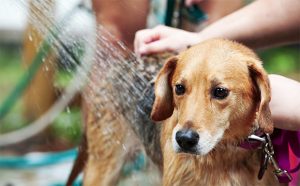 Taking care of your dog involves regular routines and daily habits. It includes not just the basics but also ways to engage your dog’s mind, keep it safe, and strengthen your bond. Loving your puppy is the first step. Learning how to look after it is key to making sure it stays happy and healthy.
Taking care of your dog involves regular routines and daily habits. It includes not just the basics but also ways to engage your dog’s mind, keep it safe, and strengthen your bond. Loving your puppy is the first step. Learning how to look after it is key to making sure it stays happy and healthy.
Here are the best practices for a regular dog care routine:
Regular Vet Visits
A responsible pet owner will ensure their dog receives regular vet visits, including routine check-ups, vaccinations, and emergency care.
Follow Through with Vaccinations
As important as any other aspect of dog care is vaccination. Common dog vaccines include parovirus, distemper, rabies, and canine hepatitis. There are others as well. Follow your vet’s recommendations as to which ones you should get.
Preventative Care
Many vet visits relate to preventative care, such as tick treatments and heartworm disease prevention. Ensure you follow up on these treatments and protect your dog from extremely uncomfortable symptoms.
Spay or Neuter
You protect your dog from certain diseases when you spay or neuter it. Spaying a female dog decreases the chance of uterus infections and breast tumours while neutering a male dog protects it from testicular and prostate cancer.
Nutritious Food
Premium-grade, nutrient-dense dog food is essential. Your dog’s health, much like any human’s, is based on what they eat. Nutritious food and dog treats are essential. This is not an area to skimp on cost.
Dental Cleaning
Toothbrushing periodically will help keep your dog’s teeth clean. It’s equally important to schedule thorough dental cleanings by a veterinarian if your dog allows it, which will clean and polish teeth. Clean teeth in a dog prevent dental illnesses, which can impact a dog’s kidneys and liver functioning.
Daily Exercise
No dog should be cooped up without exercise. Walking and exercising are important every day. Appropriate exercise keeps your pet safe, healthy, and happy. Aim for 30 minutes to a couple of hours in a single day.
Challenge Their Brain
Mental stimulation can be tremendously helpful for dogs. Teach your dog new tricks, play new games, get them to play puzzles with you, or allow them to use their noses to explore the outdoors.
Socialize Your Dog
Part of stimulating a dog’s brain is getting them to meet other dogs and socialize. This also helps train them to behave around other animals and people. If your dog struggles with this, try to spend at least a few minutes every day working on it.
Monitor Food Intake
Up to 60% of all pets in Canada are considered overweight or obese. Monitor your dog’s food intake. Know what their daily calorie count should be and do not exceed it. If you spoil your dog with too much food, it could lead to metabolic abnormalities, cardiovascular disease, and other effects.
Special Diet Considerations
You may have additional dietary recommendations for older dogs or dogs with health issues. Ensure that you get the best food for your pup.
Always Have Water Available
Ensure your dog has readily available water to maintain its hydration levels. Keep its water dish filled with clean, fresh water. Wash out its water bowl periodically to eliminate any bacteria holding on to the sides.
Groom Your Dog
Some dogs need a bath only once every few months, but others need it more often. Research your breed to understand better what they need for brushing, bathing, and nail trimming. Nail trimming is particularly essential, as not doing it could lead to injured tendons and deformed feet.
Consider Pet Insurance
While not essential, many pet parents find that pet insurance helps to significantly balance the cost of treatment and vet care. If you already have insurance, ask about pet insurance.
Reduce Hazard Exposure
Around your home, there may be dog safety hazards to take care of. Certain foods are toxic. Plants can be toxic as well. To keep your dog out of harm’s way, ensure you properly secure trash, medications, cleaning chemicals, and anything else you don’t want your dog to get into.
Treat Your Home as a Safe Space
Your dog may be anxious or stressed in certain situations. Treat your home as a safe space at all times. Avoid yelling at or punishing them unless they have done something that warrants it.
Creature Comforts
Give your pet a cozy corner and a private area to relax in their bed. Please provide them with blankets, soft toys, and fresh water in such an area.
Regularly Wash Dog Materials
When you have a dog, it’s best to regularly wash toys, blankets, and bedding to remove germs, dirt, pollen, and other irritants. This helps your dog and you if you have allergies or a particularly sensitive immune system.


